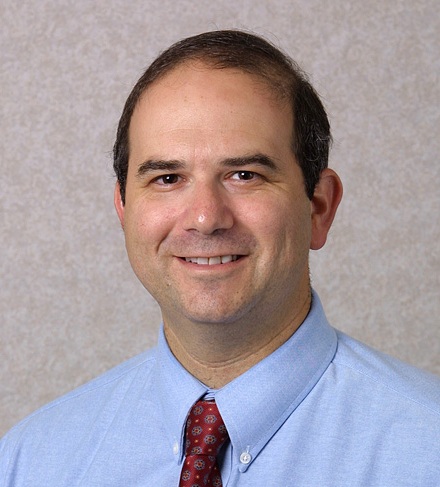SPORE GRANT WILL BOOST THYROID CANCER RESEARCH
The National Cancer Institute (NCI) has awarded a five-year, $11.3 million Specialized Program of Research Excellence (SPORE) grant that will help a multidisciplinary team of researchers led by the OSUCCC – James improve the lives of patients with thyroid cancer.
The prestigious SPORE grant, which also involves researchers at MD Anderson Cancer Center in Houston, will support four interactive projects that collectively will seek to identify genetically at-risk individuals and thus allow for early diagnosis and prediction of tumor behavior, development of approaches to minimize side effects of treatments, and development of better biomarkers and treatment options for metastatic disease.
 |
“Several factors support the importance of applying these efforts to thyroid cancer,” says SPORE Principal Investigator (PI) Matthew Ringel, MD, the Ralph W. Kurtz Chair and Professor of Medicine, director of the Division of Diabetes, Endocrinology and Metabolism, and co-director of the Thyroid Cancer Unit at the OSUCCC – James, where he is a member of the Molecular Biology and Cancer Genetics Program. “Incidence of this disease is rising at the fastest rate of all cancers in the United States and worldwide; it is now the fifth most common malignancy in women and 11th most common in men.
“Also, thyroid cancer typically takes an indolent course, so with increasing incidence there is an enlarging population of individuals surviving long term, many of whom suffer from lifelong effects of initial therapy,” adds Ringel. “And for patients with more aggressive forms of thyroid cancers, such as medullary cancer, there are no curative therapies or biomarkers that accurately predict outcome from disease or response to treatments, thereby limiting efforts to individualize therapeutic intensity.”
To achieve this goal, the researchers will focus on critical areas of need for rapid translation into clinical practice through these four projects:
- Low-Penetrance Genes in the Predisposition to Papillary Thyroid Carcinoma, co-led by Albert de la Chapelle, MD, PhD, of the OSUCCC – James, and Rebecca Nagy, CGC, of the Division of Human Genetics at Ohio State;
- Biomarker Discovery and Personalized Intervention of Radioiodine-Induced Salivary Gland Damage in Thyroid Cancer patients, co-led by Sissy Jhiang, PhD, of the OSUCCC – James, and Ricardo Carrau, MD, of the Department of Otolaryngology – Head and Neck Surgery at Ohio State;
- Developing Combination Therapies for Medullary Thyroid Cancer, co-led by Ringel and Manisha Shah, MD, both of the OSUCCC – James;
- Development and Validation of Novel Circulating Medullary Thyroid Cancer Markers, co-led by Gilbert Cote, PhD, and Steven Sherman, MD, both of MD Anderson.
The SPORE also funds supporting research cores and programs (listed below with their leaders; Ohio State personnel are shown in bold):
Core A: Integrated Clinicopathology and Biorepository – John Phay, MD, and Adel El-Naggar, MD
Core B: Biostatistics – Soledad Fernandez, PhD
Core C: Administrative – Matthew Ringel, MD, and Gilbert Cote, PhD
Developmental Research Program – Sissy Jhiang, PhD, and Steven Sherman, MD
Career Development Program – Lawrence Kirschner, MD, PhD, Robert Gagel, MD
Other investigators from Ohio State who are involved in the SPORE include:
Keiko Akagi, PhD (project 1 co-investigator); Michael Freitas, PhD, (project 2 & 3 co-investigator); Huling He, PhD (project 1 co-investigator); Krystian Jazdzewski, MD, PhD (project 1 co-investigator); Motoyasu Saji, MD, PhD (project 3 co-investigator); Jennifer Sipos, MD (project 2 co-investigator); LiHui Xu, MD, PhD (core C co-investigator).
The SPORE is the second major grant awarded by the NCI to Ohio State’s thyroid cancer program in 2013. Earlier this year, a multidisciplinary team led by Ringel as PI received a five-year, $11.3 million renewal of a Program Project Grant (PPG) first awarded in 2008 at $11.9 million to study “Genetic and Signaling Pathways in Epithelial Thyroid Cancer” – a grant that also has four interactive projects supported by cores.
Ringel says the SPORE uniquely involves studies that must be translated to the clinic within the five-year grant period and adds that, to his knowledge, it is the only one currently funded by the NCI that is solely dedicated to patients with thyroid cancer.
OSUCCC Director and James CEO Michael A. Caligiuri, MD, considers the grants to be “landmark achievements in NCI funding for Ohio State’s thyroid cancer program that represent the best in translational science.”